Digital Marketing and the 5 Stages of Travel
By Michelle Ackers on
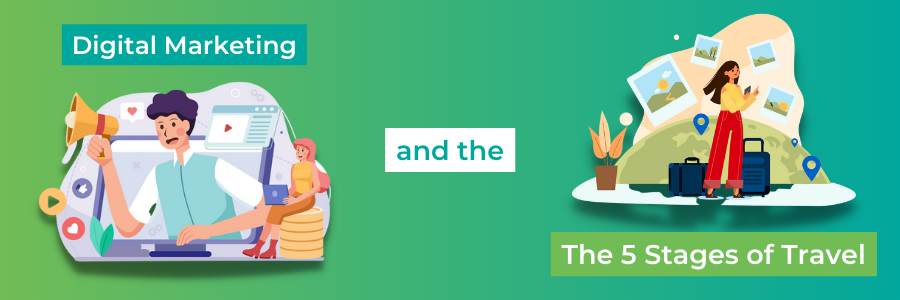
Digital Marketing or "online marketing" for tourism has now become the key marketing focus at all stages of a traveller's interaction with your business.
If you think about this customer journey in marketing terms, and more specifically for tourism marketing, we talk about The 5 Stages of Travel which include: Dream, Plan/Research, Book, Experience and Share.
The 5 Stages of Travel
There's a lot of information about digital marketing and plenty of sources of advice - it can actually seem a bit over-whelming to try and figure out your own digital marketing strategy! This guide is aimed at providing an "overview" of all the different components that might make up your digital marketing plan, with links to information on topics you may want to delve into further.
Digital marketing tactics fit nicely within the 5 Stages of Travel so it's useful to plan your marketing strategy around targeting behaviour at each stage. You can also download our PDF marketing guide about the 5 Stages of Travel.
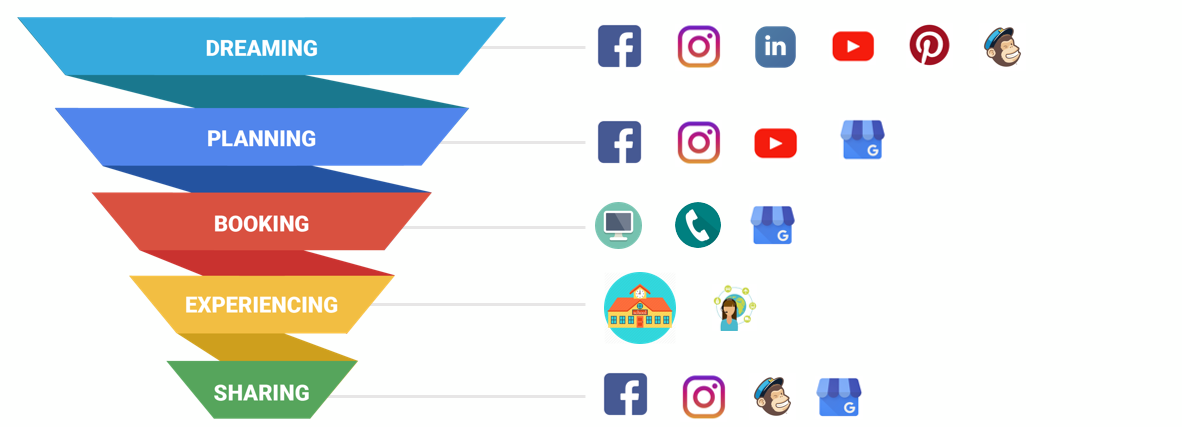
1. Dream Stage
In the dream stage people are browsing for ideas and inspiration on where they could travel to, stay, and what they want to experience. Fundamentally, the main objective of this stage is to inspire travellers with your content. The content should aim to help them visualise WHAT they could experience and WHY they should choose your business as part of that. It is emotionally driven, so tactics or tools that generate emotion will magnetise travellers to your tourism business.
 Use social media to draw attention.
Use social media to draw attention.
Social media channels are excellent for the 'Dream stage' because people prefer to just look at visual content such as short videos and images. Create content that is engaging for your target market. Platforms such as Facebook, YouTube, Instagram, Pinterest, and TikTok are a great way to target and share your 'dream' content. Checkout some great tools we recommend for creating content and 6 Insights about Instagram. Download the eBook about Pinterest for Tourism.
 Inspire with stunning images and video.
Inspire with stunning images and video.
First impressions on your social media pages count for everything. Draw the visitor in to what you offer through enticing images and powerful video marketing creating an emotional connection. See this eBook on how to create images that sell and tips on how to choose the perfect image.
 Your email marketing can entice dreamers.
Your email marketing can entice dreamers.
Travellers will return to you and your destination time and again. Domestic tourism and close-by international markets are key here.
Use your customer database to entice and attract them back - email newsletters work! Share a blog article from your website about an upcoming event, or promote a package. This email marketing guide will help give you ideas.
2. Planning Stage
During this stage travellers need detailed content that answers their questions in order to plan a trip. They need to find your website, the content needs to be accessible, informative and lead them to take action. You need to be seen where your target market is researching so it's important to diversify your online presence.
 Get found with organic search.
Get found with organic search.
A core part of being found is Google/search engines, and "organic traffic" typically makes up about 70% of your website traffic! Having a professionally search engine optimised website is vital. Ensure your SEO is done from a marketing perspective and using the latest techniques to attract your target market. Learn about the 5 SEO Marketing Success Factors for Travel.
 Get found with a Google Business Profile.
Get found with a Google Business Profile.
A Google Business Profile will be a major source of traffic and awareness. This listing will appear in search results for your business name and on the Google map for searches in your selected categories. Make sure your business is on the map and you have claimed the listing so you can manage the content.
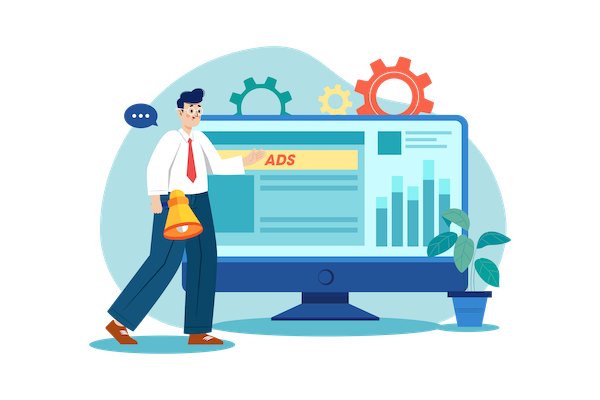 Get found with paid search and remarketing.
Get found with paid search and remarketing.
To compliment your organic search and to help combat competitors who rank well or even other paid search advertisers (like OTA's) it's a good strategy to build your own paid search and social media campaigns. Find out why SEO and Google Ads are better together, plus your DIY Guide to Facebook and Instagram Ad Campaigns.
Get found with links from travel websites.
Key authoritative tourism websites will play a big part in link referrals to your website. It's worth advertising on popular destination sites.
Being listed on Online Travel Agent (OTA) websites will bring significant referrals too, particularly if they are in the planning stage. Find out the costs and benefits of OTA's.
 Content that helps plan and decide.
Content that helps plan and decide.
Your website needs to firstly attract and inspire, see the 10 Golden Rules of web design. Then it must answer common questions to help visitors plan their trip. This can take many forms including product information, schedules, FAQ's and writing well-targeted blog articles. Find out about tourism themed websites that use all the best practices to convert.
3. Book Stage
This is a critical stage. You've inspired and informed them with brilliant digital marketing techniques and content, now you need to convert them to book. Preferably direct on your website. Don't stumble at this hurdle! Usability of your website and booking engine is crucial. Ensure it is responsive so people can book from mobile, tablet, desktop or smart tv. Do you understand and measure the cost of each form of booking acquisition?
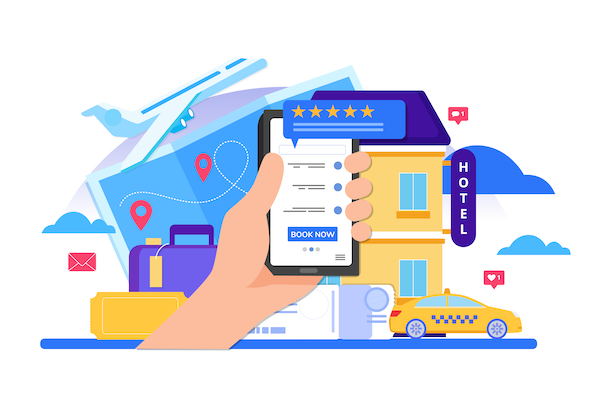 Offer an easy online booking process.
Offer an easy online booking process.
They are ready to book with you. Having an online booking system on your website will help close the deal. It needs to be professional, mobile and user-friendly, and provide instant confirmation with secure payment options. If you need advice on a suitable booking system get in touch with us.
 Be responsive to personal questions.
Be responsive to personal questions.
Sometimes people need personal help, even in a digital age. So be responsive to emails and online messaging. Messages from your social media channels or your Google Business Profile are a growing method of contact. Providing a chatbot on your website can be a great solution for 24/7 help. Or simply answer the phone if they call!
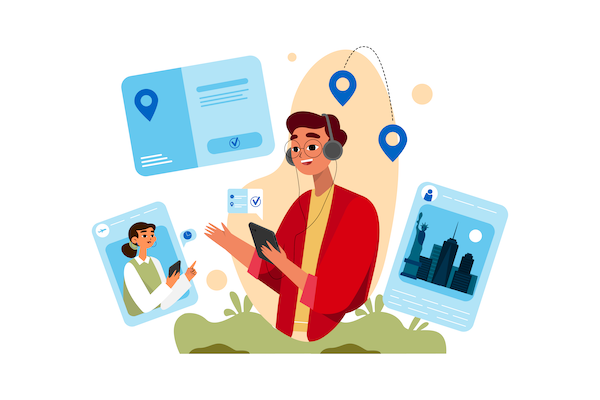 Be bookable with key Online Travel Agents.
Be bookable with key Online Travel Agents.
Whether you like it or not OTA's will continue to provide a portion of your bookings. Make sure your content on them is accurate and kept up to date. Avoid issues with incorrect availability through channel management with your booking system.
4. Experience Stage
You've achieved their valuable booking and now they are with you experiencing your incredible hospitality. Your expertise is at the forefront here, and their experience will be judged by them and who they share it with. It's vital to deliver on your promises and communicate with them upfront when something doesn't go to plan.
As well as delivering exceptional service think about the digital marketing opportunities while they are "in the moment". The experience you deliver for your customer then creates your online marketing - good or bad.
 Encourage customers to create content.
Encourage customers to create content.
Social media content shared by customers when they "in the moment" is authentic and often the best form of digital marketing you can hope for.
Encourage this daily and you will never run out of great content! See this guide to user generated content for travel and tourism.
 Use Influencers for reviews on your terms.
Use Influencers for reviews on your terms.
Social media influencers will aim to favourably promote their experience with your business. Usually in return for a free booking, and possibly payment for higher quality influencers.
Your business will no doubt be approached on a regular basis, check their social media following and engagement. Does their content and followers match your target market? Find out more on how to use influencers in your digital marketing.
5. Share Stage
The Share Stage is your opportunity to seek and obtain valuable testimonials from those you have just experienced your business. People love showing off and sharing great travel stories with images, videos and even blogs or vlogs so it's important to follow up with them in a timely way to create sharing opportunities. Online reviews are a significant marketing tool for any type of tourism business.
 Make it a habit to seek online reviews.
Make it a habit to seek online reviews.
Be proactive with seeking reviews through email follow ups post-booking. Reviews will be posted on your social media pages and travel platforms like Tripadvisor and OTA sites.
Your Google Business Profile is now also a strong source of reviews in the tourism sector, find out the 4 Steps to great reviews on Google.
 Share your stories and content.
Share your stories and content.
Have a strategy to create and share content showing your customers enjoying your experience. Have fun with creating engaging videos and images that tell your stories. Anything from spur of the moment TikToks and Instagram Reels to 20-second video highlights to share on Facebook. No professional skills required! Check out these great tools for creating content.
ABOUT THE AUTHOR
Michelle Ackers | Brand Marketing Manager
Read more articles
Tonga launches new destination brand: The Friendly Islands
By Tomahawk |

The Kingdom of Tonga has unveiled its new destination brand, “Kingdom of Tonga: The Friendly Islands”, developed in partnership with Tomahawk.
Drawing on Tonga’s globally recognised nickname, The Friendly Islands, the new brand...
The Evolution of Content
By Tomahawk |

If you're a tourism business trying to stand out online today, you’ve likely felt the challenge of producing content that actually gets noticed. The right content done well will help to drive visibility, trust, and engagement across...

